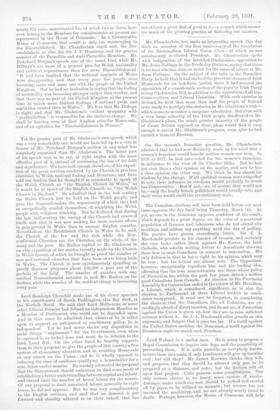Yet the greater part of Mr. Gladstone's own speech, which
was a very remarkable one, would not have led up to a vote in favour of Mr. Pritchard Morgan's motion in any mind less singularly organised than Mr. Gladstone's. The latter part of his speech was, so to say, at right angles with the most effective part of it, instead of continuing the line of its drift and significance. We have said enough elsewhere of his exposi- tion of the greet services rendered, by the Church in previous centuries, to Welsh national feeling and literature, and have told our readers that he thought it as reasonable to speak of the Welsh Church as "the English Church in Wales," as it would be to speak of the English Church as "the Welsh Church in England." He admitted that in the last century the Welsh Church lost its hold on the Welsh people, and gave the Nonconformists the opportunity of which they had so energetically availed themselves, of supplying the Welsh people with religious teaching. But he declared that during the last half-century the energy of the Church had renewed itself, and that it was now making far more zealous efforts to gain ground in Wales than in average English counties. Nevertheless, the Established Church in Wales is, he said, the Church of the few and the rich, while the Non- conformist Churches are the Churches, on the whole, of the many and the poor. Mr. Raikes replied to Mr. Gladstone in an able exposition of the strides recently made by the Church in Welsh favour, of which he brought as proof the number of new and restored churches that have been or are being built in Wales. The Church is now spontaneously spending on purely diocesan purposes about £50,000 a year out of the pockets of the laity. The number of parishes with any resident Nonconformist minister is, said Mr. Raikes, on the decline, while the number of the resident clergy is increasing every year.






































 Previous page
Previous page